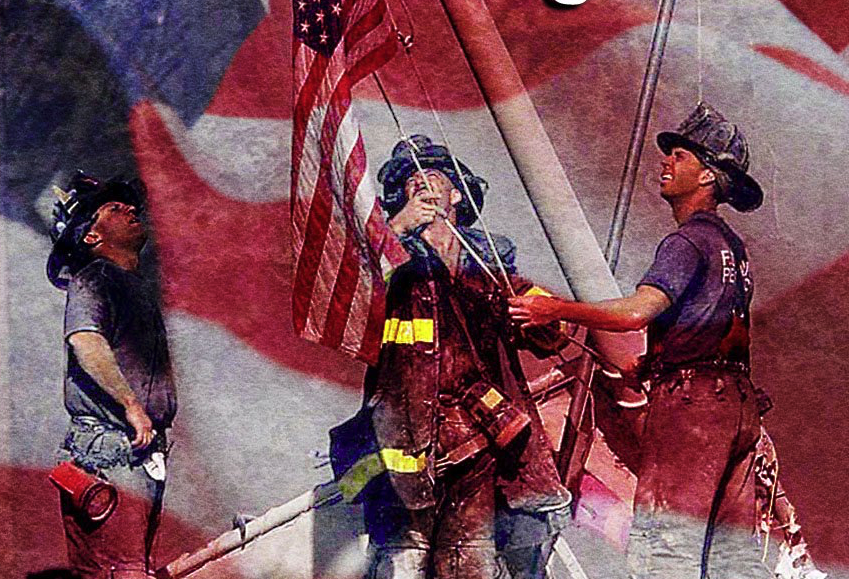By Chris Spangler
Where were you on Sept. 11, 2001?
As then-managing editor of the Daily Union, I was laying out the front and “jump” pages of the newspaper. It was well ahead of our 11 a.m. deadline and I had most of my pages complete.
Then, just after 7:45 a.m., a brief bulletin came over the Associated Press “wire”: “Airplane hits World Trade Center.”
My first thought was that a student pilot in a Piper Cub somehow had lost his or her way and ended up clipping one of the twin towers. Such things had happened to skyscrapers before. I continued what I was doing, expecting an update soon.
Five minutes later, the art director of Hoard’s Dairyman magazine next door ran into the newsroom to report that an airplane had hit the World Trade Center. I said we knew. Then he said it was a passenger jet and the north tower was on fire.
Nothing else was coming from AP yet, so we all gathered at the lone computer that had Internet access (it was 2001, remember) and found photos of the crash. I returned to my desk to begin moving all the front-page stories down the page so I would have space for the eventual wire story about this incident across the top.
A short article arrived and, as AP reporters started calling in information, additions and “write-thrus” dribbled in. Then, at 8:03 a.m., another bulletin: “Second plane flies into World Trade Center.”
Had we not suspected an intentional terrorist attack before, we certainly did now. And as the morning continued, AP reported the Pentagon and Pennsylvania plane crashes, as well.
Two decades later, my mind’s eye still can see the horrific scenes as if it were yesterday.
WTC workers jumping to their deaths as flames filled their floor. Panicked dust-covered “ghosts” running away from the disaster. The huge smoking gap in the Pentagon. The scorched earth in a Shanksville, Pennsylvania, farm field.
As the days went on, we learned of countless acts of heroism: The United Flight 93 passengers who, with a “let’s roll,” sacrificed their own lives to ensure that their plane’s hijackers would not make it to the nation’s capitol.
A 24-year-old equities trader on the 104th floor of the World Trade Center who made his way down to the 78th-floor sky lobby to help at least a dozen injured and disorientated office workers to safety. After carrying one woman down 15 flights of stairs, he turned and went back up to look for more. He did not make it out alive.
And, of course, the 412 heroic firefighters, police officers and paramedics who, despite the extreme danger, walked into the fiery towers as civilians were streaming out. They, too, would never go home again.
All told, 2,977 people were killed and more than 6,000 were injured in what would become known simply as 9/11.
The irony of the numerical date would not escape us, as the national emergency 20 years ago today changed who we are as a people.
It awakened Americans to the fact that global terrorism can hit home and we, as a nation, can never sit complacent. It ignited a spirit of patriotism and unity, and spurred empathetic support from all of our allies and even many of our enemies.
However, as time went on, 9/11 also fundamentally changed our nation’s approach to counterterrorism, intelligence analysis and how to balance them without violating individual privacy and civil liberties. The latter still is up for debate.
The terrorist attacks triggered a “war on terror” that raged for two decades. Osama bin Laden and other terrorists are dead, yet the Taliban again rules Afghanistan and a smaller, but just as committed, al-Qaida — not to mention other like-minded extremists — survives.
Sept. 11, 2001, revived in this country a latent mistrust of Muslims and other “foreigners.” Racial profiling and bigotry spread as significant changes in immigration policy and law focused on protecting our homeland from “outsiders” who might do us harm.
That same intolerance turned inward, with even our own leaders feeding the polarization and giving bravado to racists and extremists looking for an excuse to act out. It all came to a head on Jan, 6, 2021, when, incredibly, thousands of insurrectionists stormed the U.S. Capitol.
I don’t mean to be all doom and gloom, though. The divisiveness also has spawned shows of great unity, as many hopeful Americans continue to work toward equality, “liberty and justice for all.” They know that deep down, we are a nation of kind and caring people.
We can’t travel back to Sept. 10, 2001, when the world seemed a little more safe, and a lot more sane. But we can move forward starting today.
All too many souls have been lost in the fight for freedom these past two decades. As Americans did in the wake of 9/11, let us set aside our differences and stand together as one.

Public domain/file photo
This post has already been read 1520 times!